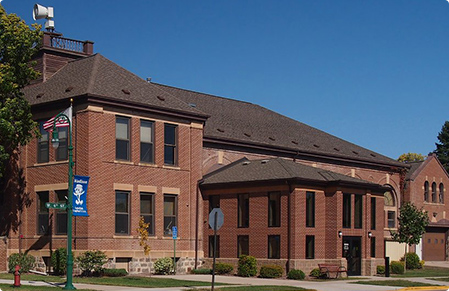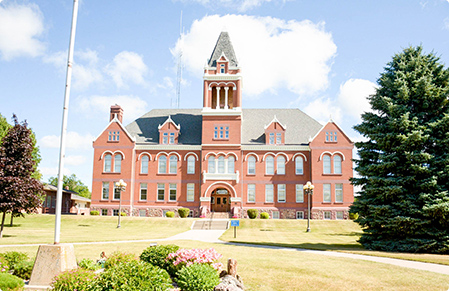City Government
 Madison is a home rule charter city, with a council/manager form of government. This means that Madison determines the form and style of government.
Madison is a home rule charter city, with a council/manager form of government. This means that Madison determines the form and style of government.
The mayor is elected-at-large and serves as the chief elected officer for a two-year term of office. The mayor serves as the presiding officer at council meetings, ceremonial head of the city and is responsible for representing the city before the Minnesota Legislature, federal agencies as well as other local governments. Election of the mayor takes place during the even numbered years. There are four council members who are elected-at-large serving four-year staggered terms of office. Elections are held on the even numbered years. The City of Madison is a single ward with all citizens voting at City Hall.
The city council members’ charter/statutory duties are to be performed, as a whole. The council formulates policy, exercises city policies, provides for planning and monitors the city’s performance. The city manager serves as the chief administrative officer providing oversight for daily operations along with supervision of the city’s administrative departments.
There are several boards and commissions that advise the city council on various matters of community interest. Madison’s form of government was designed to encourage public participation and input. Examples are the Madison Park Board, Madison Planning & Zonning Commission, Madison Public Library Board along with representation on the Lac qui Parle County Airport Commission, and the Pioneerland Regional Library System.
The City of Madison has a Madison City Charter Commission that provides oversight and maintenance of the city’s Home Rule Charter. The Madison Charter Commission is appointed by and serves at the direction of the Chief Judge of the 8th Judicial District. Reporting of activities is annually to the judicial district court and the city council.
The City of Madison has population of 1,551 based on the 2010 US Census. Madison has 11 full time, 9 part time and 18 seasonal employees. The fire service has 25 volunteers with the ambulance service maintaining 15 part-time paid on-call.
County Government
 The County of Lac qui Parle is an administrative arm of the State of Minnesota and was created to carry out certain mandates. Traditionally, counties performed state mandated duties which included assessment of property, record keeping (i.e. property and vital statistics), maintenance of rural roads, administration of election and judicial functions, maintaining peace in rural areas, and poor relief.
The County of Lac qui Parle is an administrative arm of the State of Minnesota and was created to carry out certain mandates. Traditionally, counties performed state mandated duties which included assessment of property, record keeping (i.e. property and vital statistics), maintenance of rural roads, administration of election and judicial functions, maintaining peace in rural areas, and poor relief.
Today, counties are in other areas of government support, including social services, corrections, child protection, library services, hospitals and rest homes, public health services, planning and zoning, economic development, parks and recreation, water quality, solid waste management, area-wide county airports, regional library system and a regional railroad authority. Relief to the poor is generally provided by the federal and state governments through the income maintenance programs as part of the social services function.
Lac qui Parle County is governed by a five member board of county commissioners who are elected by district. Citizens regardless of whether they live in a city, town, or unorganized territory, are represented by a county commissioner. Commissioners are elected for four year staggered terms on the even numbered years.
In Lac qui Parle County, the voters elect an at-large county sheriff and the county attorney with the combined offices of county auditor/treasurer and county recorder are appointed. The county also engages in sharing resources with other agencies and of particular is the Lac qui Parle County Airport, Lac qui Parle Regional Rail Authority, Pioneerland Regional Library System, Countryside Public Health, University of Minnesota Extension Services such as 4 H, Lac qui Parle County Water Resource Committee to mention but a few…
Lac qui Parle County has a population of 7,259 based on the 2010 US Census and has an area of 768 square miles.
